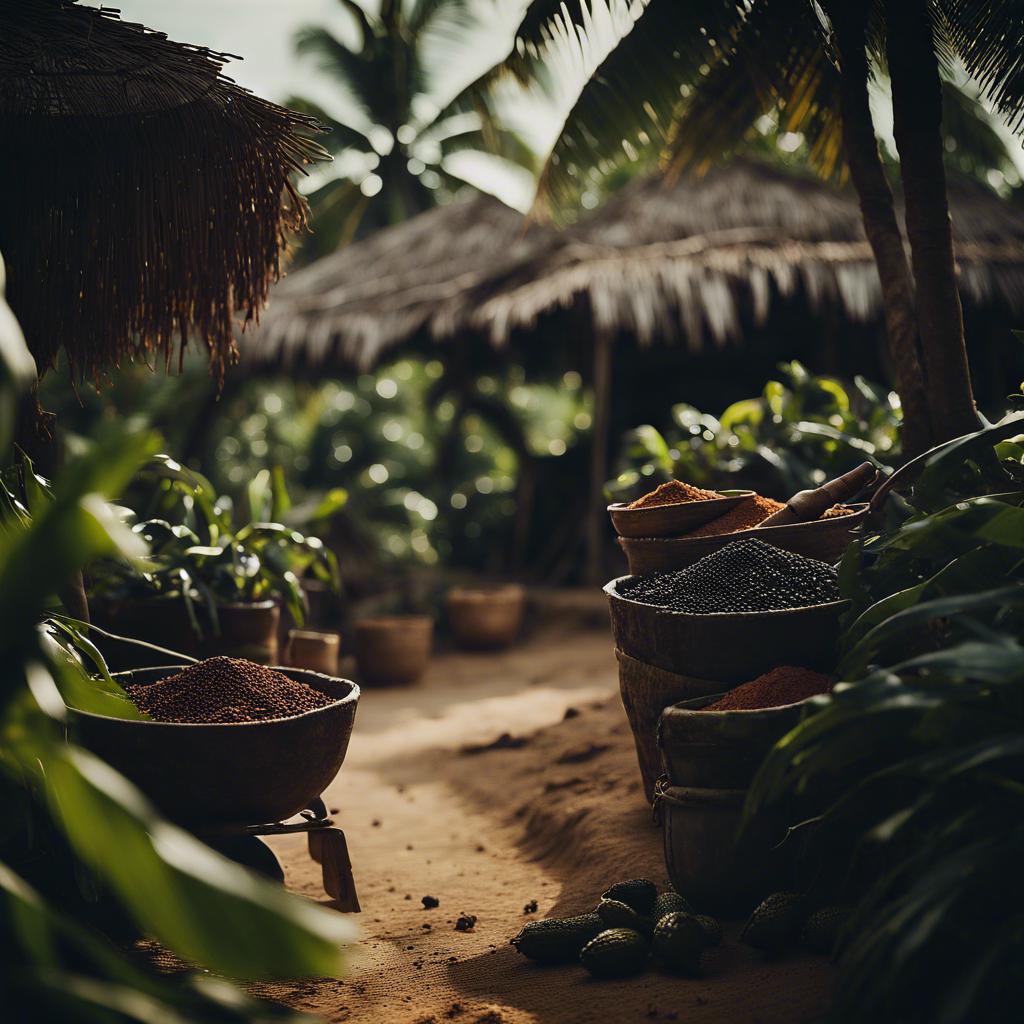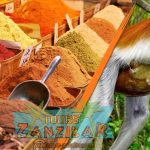Nestled along the azure shores of the Indian Ocean, Zanzibar is often celebrated for its stunning beaches and crystal-clear waters. However, beyond its coastal allure lies a fragrant world of green that beckons to be explored: Zanzibar’s historic spice farms. With a heritage steeped in the production of cloves, nutmeg, cinnamon, and black pepper, these spice farms offer a rich tapestry of sensory experiences and a window into the island’s vibrant culture and history. In this article, presented by Tours-Zanzibar.com, we delve deep into the heart of Zanzibar’s countryside to guide you through its captivating spice plantations. Discover how these farms operate, learn about the traditional uses of their spices, and gain insider tips on fully embracing this unique aspect of Zanzibar’s identity — far beyond its picturesque beaches. Join us on a journey that promises as much education as it does enchantment in the exotic spice farms of Zanzibar.

Exploring the Origins of Zanzibar’s Spice Farms
Unraveling the Historical Roots of the Isle’s Aromatic Treasure
Zanzibar, often celebrated for its pristine beaches and crystal-clear waters, holds a fragrant secret inland where verdant spice farms flourish. The spice industry of Zanzibar did not blossom by chance; it was carefully cultivated by the Omani Arabs in the early 19th century when Sultan Seyyid Said shifted his capital from Muscat to Zanzibar. Recognizing the island’s fertile soil and ideal climatic conditions, he initiated the plantation of cloves, thus sparking a booming agricultural revolution that would eventually encompass a variety of spices.
The Agricultural Expansion
The inception of clove plantations marked just the beginning. With time, the island’s agricultural portfolio diversified, bringing to the fore a myriad of spices, including black pepper, cinnamon, nutmeg, and vanilla. This expansion was supported by the slave trade, a dark and integral part of Zanzibar’s history up until the late 19th century. The abolishment of the slave trade led to the reformation of the spice industry, turning what was once a symbol of colonial exploitation into a sustainable, locally-driven economic backbone.
Today, Tours-Zanzibar.com allows you to experience these historically rich spice farms firsthand through guided tours. Each visit provides a sensory experience as travelers can see, touch, taste, and smell various spices in their natural setting. Here’s what a typical tour might include:
- A walk through the shaded paths enveloped in the aroma of fresh spices.
- Insights into the cultivation techniques passed down through generations.
- Opportunity to purchase freshly ground spices from local vendors.
These spice farms transcend their commercial value and narrate the tale of Zanzibar’s transformation and resilience, making them a must-visit for anyone looking to delve deeper into the island’s layered history beyond its beaches.
The Aromatic Experience: What You Can Expect to See and Smell
A Journey Through Fragrance and Color
Imagine strolling through emerald groves where the air is thick with the earthy aroma of cloves, the sweetness of cinnamon, and the sharp zest of lemons. At Tours-Zanzibar.com, we specialize in guiding visitors through Zanzibar’s verdant spice farms, where the senses are treated to a carnival of scents and sights. Each step through these aromatic gardens reveals visual delights and a story of history and culture ingrained within each plant and flower.
Visual Delights
As you navigate the winding paths of the spice farm, expect to be greeted by an array of vibrant colors. From the fiery red of chili peppers dangling amidst lush foliage to the rich brown of the cinnamon bark and the subtle green of vanilla orchids, the palette is as diverse as it is delightful. The scenery changes with the seasons, so every visit offers a unique tableau painted by nature. Breathtaking bursts of color from tropical flowers intermittently dot the landscape, providing splendid photo opportunities.
The Symphony of Scents
- Peppery punch: Freshly plucked black pepper’s spicy tang tingles the nostrils with its intense aroma.
- Sweetness in the air: The heady fragrance of nutmeg fills the air with a sweet, spicy scent that is comforting and warm.
- Citrus whispers: Hints of citrus from fragrant lemongrass and zesty lemon trees cut through the spicy air with a refreshing sharpness.
These experiences are accompanied by insightful commentary from experienced guides who explain the process of spice cultivation and harvesting. You’ll learn which spices are native to Zanzibar and how many arrived here from far-off lands, transforming the island into the ”Spice Island.” Tap into the practical uses of each spice, whether it be in Zanzibari cuisine, medicine, or traditional ceremonies. Engaging in these tours is a sensory treat and an educational journey that will enrich your understanding of Zanzibar’s heritage and its global significance in the spice trade.
| Spice | Description | Uses |
|---|---|---|
| Cloves | Dark, aromatic buds that are the essence of Zanzibar’s spice legacy. | Culinary spices, medicine, perfumes |
| Turmeric | Bright yellow spice, earthy and spicy. | Coloring, flavoring in food, anti-inflammatory remedies |
| Cardamom | Small pods with a potent, sweet fragrance. | Culinary uses in sweets and teas, digestive aids |
By the end of your tour, the intoxicating fragrances and mesmerizing scenes of Zanzibar’s spice farms will leave a lasting impression, rich with knowledge and sensory delights.
Top Spice Farms to Visit in Zanzibar
Explore the Aromatic Delights of Local Spice Farms
Embarking on a journey through Zanzibar’s spice farms is like stepping into a fragrant paradise, where the air is filled with the scents of cloves, cinnamon, nutmeg, and vanilla. Guided tours arranged by Tours-Zanzibar.com demystify the cultivation process and showcase the island’s rich cultural heritage associated with spice production.
Tangawizi Spice Farm
- Located in the heart of Zanzibar, the Tangawizi Spice Farm offers a vibrant display of spices, tropical fruits, and medicinal herbs. Visitors can enjoy a guided walk through the lush fields, learning how each item is grown, harvested, and used in everyday cooking and traditional medicine.
- The farm also features a live cooking demonstration, allowing guests to taste and experience the spices in traditional Zanzibari cuisine.
Kizimbani Agricultural Training Institute
A visit to the Kizimbani Agricultural Training Institute provides a more educational perspective on the agricultural techniques and innovations in spice farming. Noteworthy for those interested in sustainable practices, Kizimbani offers insights into:
| Feature | Description |
|---|---|
| Hybridization | Learn about the methods used to develop more resilient spice varieties. |
| Organic Farming | Discover the benefits and challenges of transitioning to organic spice cultivation. |
Both locations provide a unique experience highlighting the importance of Zanzibar’s spice trade, both past and present. Tourists looking to delve beyond the typical beach vacation will find these tours enlightening and aromatic twists to their Zanzibar adventure.
Cultural Insights: The History of Spices and Zanzibar’s Global Impact
Zanzibar, often called Spice Island, has a rich history deeply intertwined with the trade of spices. This element shaped not only its economy but also its cultural heritage. The roots of Zanzibar’s spice history can be traced back to the 16th century when the Portuguese established the first trade routes. This was further expanded by the Omani Arabs in the 19th century, turning Zanzibar into a thriving center for the spice trade.
A Look at the Spice Trade Evolution
As you explore spice farms with Tours-Zanzibar.com, you understand Zanzibar’s significant role in the global spice market. Local guides recount how cloves, nutmeg, cinnamon, and black pepper reached the island and found a new home among the twisting paths and lush greenery. Here’s how these iconic spices influenced the globe:
- Cloves, originally native to the Maluku Islands in Indonesia, were brought to Zanzibar in the 18th century. The island soon became the world’s leading producer, famously known as the ‘King of Cloves’.
- Nutmeg and cinnamon, originating from the Spice Islands and Sri Lanka, respectively, found their way to the island via trade routes managed by the Arabs and Indians, infusing local cuisine with widely appealing flavors.
- Black pepper, once considered as precious as gold in Europe, contributed to Zanzibar’s reputation as a crucial stop on the maritime Silk Road.
Today, Zanzibar’s spice farms serve as a living museum for these historical narratives and as active contributors to the island’s economy and cultural identity. The intermingling of different culinary traditions here has created a unique local cuisine imbued with flavors that echo its multicultural history. Zanzibar’s spices’ cultural significance and global impact are integral to understanding the island’s unique charm, which is a point of pride for locals and an intriguing attraction for visitors.
Guided Tours vs. Self-Exploration: Choosing Your Experience
Choosing the Right Tour for Your Zanzibar Spice Farm Experience
Guided Tours: Opting for a guided tour through Tours-Zanzibar.com can enhance your visit significantly. With a knowledgeable guide , you will be immersed in each spice’s rich history and cultural significance. Learn about the agricultural, culinary , and medicinal uses of cloves, nutmeg, cinnamon, and more. Our guides are local experts who provide insightful stories and answer any questions. A guided tour ensures you do not miss the hidden gems often overlooked by independent travelers. Additionally, logistical aspects like transportation and entry fees are conveniently handled, allowing you to enjoy a stress-free outing.
Benefits of a Guided Tour
- Detailed insights and stories
- Convenience of organized logistics
- Interaction with a knowledgeable local expert
Self-Exploration: For those who prefer adventure and flexibility, exploring the spice farms on your own can be rewarding. This option best suits repeat visitors with a strong sense of direction and ample time. You can move at your own pace, linger as long as you wish at spots that interest you the most, and perhaps even discover quaint areas off the beaten path. However, remember that self-guided tours require preparation regarding transportation, finding suitable farms, and understanding the routes.
Considerations for Self-Exploration
- Requires more advanced planning and preparation
- It is ideal for visitors familiar with the area or those seeking adventure.
- Greater flexibility in scheduling and pace
Whether you choose the structured depth of a guided tour or the free-spirited nature of exploring on your own, visiting Zanzibar’s spice farms offers a unique blend of educational and sensory delights beyond the beautiful beaches. Consider your preferences and the kind of experience you wish to have to make the best choice for your trip.
Local Delicacies: Foods and Drinks to Try at the Farms
Explore Culinary Delights on Your Spice Farm Tour
When you visit Zanzibar’s spice farms with Tours-Zanzibar.com, you’re not just on a journey through rows of fragrant cloves and towering vanilla vines; you’re also set to embark on a culinary adventure. The farms offer more than just a feast for the eyes; they provide a taste of traditional Swahili cuisine, enriched with the freshest spices you’ll see harvested right before your eyes.
Must-Try Foods
As you wander through the spice farm, make sure to indulge in some of the local specialties. Each dish not only offers a burst of flavor but tells a story of the island’s rich cultural tapestry:
- Pilau – A hearty spiced rice dish cooked with various fresh spices such as cloves, cinnamon, and cardamom, commonly enjoyed at celebrations.
- Octopus Curry – A beloved coastal dish that perfectly encapsulates the blend of Zanzibar’s Indian Ocean waters and its spice heritage.
- Zanzibar Pizza – A unique street food delicacy akin to a stuffed pancake with a delightful blend of spiced meat and vegetables, wrapped and fried to perfection.
Local Beverages to Sip
No culinary tour is complete without savoring the local beverages that complement the food. Whether it’s a refreshing daytime drink or a little something for a sunny afternoon, there are beverages for every palate:
- Mchai – Chai steeped with a medley of spices, including ginger, cloves, and cinnamon, offering a warming drink that stimulates the senses.
- Tangawizi is a ginger tea that packs a punch. It is ideal for rejuvenating after a walk through the humid farms.
- Mango Juice – Made from the freshest mangos, this sweet and vibrant juice provides the perfect tropical refreshment.
Sustainable Practices and Supporting Local Communities
Embracing Eco-Friendly Methods
At the heart of Tours-Zanzibar.com’s ethos is a staunch commitment to eco-sustainability. Each spice farm we introduce to you employs techniques that conserve the environment and enhance the quality of the spices produced. Through practices like organic farming, composting, and natural pest management, spice farms ensure that their operations add back to the soil rather than depleting it. This approach keeps the ecosystem vibrant and healthy and ensures that the spices you experience are of the highest caliber, teeming with natural flavors and aromas.
Benefits of Supporting Local Spice Farms
Choosing to visit local spice farms can significantly uplift the local communities. Here’s how:
- Economic Empowerment: By visiting these spice farms, your tours contribute directly to local economies. Each tour fee helps a farmer maintain sustainable practices that might otherwise be financially unviable.
- Preservation of Heritage: Spice farming is deeply ingrained in Zanzibar’s culture. By participating, you help maintain these age-old traditions and encourage the passing down of knowledge through generations.
- Education & Awareness: Engaging with the farmers provides deeper insights into the agricultural heritage of Zanzibar, fostering a greater appreciation and respect for these time-honored practices among visitors.
Environmentally Responsible Tourism
Tours-Zanzibar.com is dedicated to ensuring that your visit makes a positive impact. We coordinate with farms demonstrating a solid commitment to sustainable practices, ensuring that your tourism footprint is as light and beneficial as possible. By choosing eco-conscious travel, we aid in fostering a sustainable future for the enchanting island of Zanzibar.
Tips for Preparing for Your Visit and What to Bring
Making the Most of Your Spice Farm Tour
Preparation is the key to enjoying any excursion, and visiting one of Zanzibar’s enchanting spice farms is no exception. Before you set off on your aromatic adventure with Tours-Zanzibar.com, take a moment to ensure you have everything you’ll need for a comfortable and enlightening experience.
Essential Items to Pack
- Comfortable Footwear: You’ll be walking through the farms, so durable, closed-toe shoes are advisable.
- Light Clothing: Opt for breathable fabrics to remain calm, but consider long sleeves and pants to protect from the sun and insects.
- Water Bottle: Stay hydrated as you explore the sensory delights of the tropics.
- Camera: You’ll encounter many photo-worthy moments as you discover the origins of spices like clove, nutmeg, and vanilla.
- Notepad: A pocket-sized notebook is excellent for sharing exciting facts or recipes your guide shares.
Before your visit, consider reading up on the types of spices you will encounter. Not only will this enrich your tour, but it will also enhance your appreciation of the spices once you return home.
Prior Arrangements
Confirm the timing and pickup points a day before your tour. Tours-Zanzibar.com usually advises participants to check in with their tour guide or local contact. Remember, some parts of the farm might be more accessible than others, so if you have mobility concerns, inform your guide beforehand to accommodate your needs adequately.
Lastly, don’t forget to prepare your senses for an incredible fusion of aromas, textures, and flavors – a true feast set against the lush backdrop of one of Africa’s most beautiful islands.
To Conclude
In conclusion, Zanzibar’s spice farms offer more than just a glimpse into the rich tapestry of flavors that adorn local cuisine; they allow visitors an immersive insight into the historical and cultural heartbeat of the island. Beyond the picturesque beaches, these spice farms narrate stories of commerce, colonialism, and culture that have shaped Zanzibar over centuries. Touring these farms satisfies the palette and enriches one’s understanding of how deeply Zanzibar’s agriculture is connected to its identity. Whether it’s witnessing the traditional methods of spice cultivation or engaging with local farmers, your visit to Zanzibar’s spice farms promises a compelling blend of education and sensory delight. As you plan your trip, remember that exploring these verdant gardens is an opportunity to experience Zanzibar beyond its coastal allure and into its aromatic woods—a splendid synthesis of nature’s offerings and human heritage.














